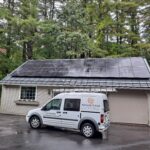With the growing adoption of solar technology in Massachusetts and other states around the country, more and more PV installers have entered the marketplace. Between large national solar companies, smaller regional installers, or construction companies with some solar expertise, there are many different options to choose from. You’re not always going to be comparing apples to apples. So really, what should you look for in a solar installer?
1. What work have they done?
Naturally, you would think the large, national firm may have the most experience. Large companies may have a large portfolio of installations, but that doesn’t mean their crew has a lot of experience. To avoid headaches and unnecessary delays, you should seek a company who has a familiarity with the local weather conditions, regional permitting rules and electric codes, and state and municipal incentive programs. You should also inquire about the types of projects the contractor typically works on. Some companies are better suited for residential/small commercial projects, while others work exclusively on large-scale solar farms.
2. Are they properly licensed and insured?
Licensing varies by state. I recommend you look up the licensing necessary for your state and make sure your installer has these credentials. In addition to this, find out if they are approved for your state’s rebate program. Massachusetts, for instance, does not have approved installers, but they do designate expedited installers who have earned the privilege to more quickly complete applications and process rebate payments. There is also one voluntary certification program that provides a national standard of excellence for industry professionals. NABCEP, or the North American Board of Certified Energy Professionals, administers PV installer credentialing. In order to obtain the PV certification, applicants must meet experience prerequisites and a pass a rigorous exam encompassing PV system design, installation, safety, project management, maintenance, troubleshooting, etc. Of the more than 14 million people living in New England, only 100 have obtained the NABCEP certification. NABCEP PV Installer certification is tied to individuals rather than a company. With any company that you work with, they may have certified installers, but they may not be tied specifically to your project. My company, Brightstar Solar, guarantees at least one NABCEP certified PV installer will be on-site at all times during construction of your system.
3. Is the work being subcontracted?
After the sale, many PV systems are farmed out to subcontractors for rebate, installation, and service. Since big box stores, like Home Depot and Lowes, and national group-based solar purchasing concepts have aggressively entered the market, they are also quickly expanding their installer network to construct these systems. Let’s face it, a good solar company will not have any problems finding work, nor do they want the headaches of dealing with a middleman. That means they won’t need to sign on with the big box store or solar marketing firms. So who’s doing the work?
4. Where is the company headquartered?
You are probably asking yourself, why does that matter? Well, larger national solar companies are based in California, Colorado, and Maryland. If you’re a Massachusetts homeowner, do you really want to speak to someone in California if your system fails, or would you prefer to talk to someone local? I would go with the local person who can more quickly send someone out to diagnose and fix the problem.
5. Can you find reviews?
I have a friend who will never call references. She says, “Why waste my time on someone who is almost certainly going to say positive things about their experience? I mean, what contractor would offer a bad reference.” It is a tell-tale sign when a company can’t furnish any references, though. Solar-Estimate.org, a not for profit and free service, is one of the best review sites for solar installations. Any professional or company can join the site, but they give their “Pre-Screened Status” to companies who have been in operation for 3 years, have three good professional and customer references in the last 12 months, and have been approved by ContractorCheck.com. Make sure you look for reviews with a local zip code because you will see those out-of-state submissions grouped in there, especially for the larger national installers. Out-of-state reviews are not a good indication of what your experience will be like because you will deal with a different sales, service, and installation team.
I’ve touched the surface of the more important questions when making the decision of choosing a PV installer, but next I want to go over what to ask about the equipment and the installation work itself. Brightstar Solar works with residential and commercial customers in Massachusetts to navigate the installation process and maximize solar financing and incentive opportunities. If you are interested in learning more about how solar power can offset your electricity demand for your home or business in Massachusetts, please contact us for a free evaluation of your site.








I don’t think the title of your article matches the content lol. Just kidding, mainly because I had some doubts after reading the article.
Your point of view caught my eye and was very interesting. Thanks. I have a question for you.
Thanks for sharing. I read many of your blog posts, cool, your blog is very good.
I was very pleased to discover this site. I need to to thank you for your time just for this fantastic read!! I definitely loved every part of it and I have you saved as a favorite to check out new things on your web site.
Thank you for addressing such an important topic in this post Your words are powerful and have the potential to make a real difference in the world
People who are tax resident in multiple country may be liable to pay tax greater than once on the same income.
meget af det dukker op overalt på internettet uden min aftale.
que eu mesmo criei ou terceirizei, mas parece que
I do agree with all of the ideas you’ve presented in your post. They’re very convincing and will certainly work. Still, the posts are too short for starters. Could you please extend them a bit from next time? Thanks for the post.
The telecommunications sector in Iraq is experiencing rapid growth, creating opportunities for businesses involved in technology, infrastructure, and service provision. BusinessIraq.com brings you comprehensive coverage of this exciting sector, examining trends in mobile phone usage, internet penetration, and the development of 5G networks. We explore government policies aimed at expanding connectivity, analyze market competition among telecom providers, and examine the investment climate for businesses seeking to enter this dynamic market. Understand the challenges and opportunities in this rapidly transforming landscape.
There is also a spot contract in a commodity market where delivery and payments of commodities are done quickly or in a short span of time and physical trading includes a visual inspection of the farmers market on the other hand in derivative markets trading can be done without any inspection.
Reclaiming what’s yours shouldn’t be a hassle. That’s why our methodology is user-friendly and open.Simply give us your transaction details, and we’ll take care ofthe rest.Don’t let a simple mistake keep you from your hard-earned money.Our goal is to help you recover every cent.
3月28日 – ドコモによるローソンへの資本参加及びお客さまのさらなる利便性向上を目的と、業務提携。身の機能と構造の障害と生活上の支障が生じたときに、個人とその人が生活する環境を対象に、多数専門職種が連携して問題の解決を支援する総合的アプローチの総体をいう。 リハビリテーションとは、障害をもった個人を援助し、可能な限りその機能を発揮させるように、そして社会のなかにインテグレート(統合)させるように、医学的・
Thanks for sharing. I read many of your blog posts, cool, your blog is very good.
Hello, I think your site might be having browser compatibility issues. When I look at your website in Safari, it looks fine but when opening in Internet Explorer, it has some overlapping. I just wanted to give you a quick heads up! Other then that, awesome blog!
Your point of view caught my eye and was very interesting. Thanks. I have a question for you.
Pretty section of content. I just stumbled upon your site and in accession capitalto assert that I acquire in fact enjoyed account your blog posts.Any way I’ll be subscribing to your feeds and even I achievement you access consistently rapidly.
Your posts are so beautifully written and always leave me feeling inspired and empowered Thank you for using your talents to make a positive impact
This will be a excellent website, could you be interested in doing an interview about just how you designed it? If so e-mail me!
Wow, superb blog layout! How long have you been blogging for? you made blogging look easy. The overall look of your website is excellent, let alone the content!
Good website! I really love how it is easy on my eyes and the data are well written. I am wondering how I might be notified when a new post has been made. I have subscribed to your feed which must do the trick! Have a nice day!
buď vytvořil sám, nebo zadal externí firmě, ale vypadá to.
شركة Bwer هي أحد الموردين الرئيسيين لموازين الشاحنات ذات الجسور في العراق، حيث تقدم مجموعة كاملة من الحلول لقياس حمولة المركبات بدقة. وتغطي خدماتها كل جانب من جوانب موازين الشاحنات، من تركيب وصيانة موازين الشاحنات إلى المعايرة والإصلاح. تقدم شركة Bwer موازين شاحنات تجارية وموازين شاحنات صناعية وأنظمة موازين جسور محورية، مصممة لتلبية متطلبات التطبيقات الثقيلة. تتضمن موازين الشاحنات الإلكترونية وموازين الشاحنات الرقمية من شركة Bwer تقنية متقدمة، مما يضمن قياسات دقيقة وموثوقة. تم تصميم موازين الشاحنات الثقيلة الخاصة بهم للبيئات الوعرة، مما يجعلها مناسبة للصناعات مثل الخدمات اللوجستية والزراعة والبناء. سواء كنت تبحث عن موازين شاحنات للبيع أو الإيجار أو التأجير، توفر شركة Bwer خيارات مرنة لتناسب احتياجاتك، بما في ذلك أجزاء موازين الشاحنات والملحقات والبرامج لتحسين الأداء. بصفتها شركة مصنعة موثوقة لموازين الشاحنات، تقدم شركة Bwer خدمات معايرة موازين الشاحنات المعتمدة، مما يضمن الامتثال لمعايير الصناعة. تشمل خدماتها فحص موازين الشاحنات والشهادات وخدمات الإصلاح، مما يدعم موثوقية أنظمة موازين الشاحنات الخاصة بك على المدى الطويل. بفضل فريق من الخبراء، تضمن شركة Bwer تركيب وصيانة موازين الشاحنات بسلاسة، مما يحافظ على سير عملياتك بسلاسة. لمزيد من المعلومات حول أسعار موازين الشاحنات، وتكاليف التركيب، أو لمعرفة المزيد عن مجموعة موازين الشاحنات ذات الجسور وغيرها من المنتجات، تفضل بزيارة موقع شركة Bwer على الإنترنت على bwerpipes.com
シーズンに入ると、大竹、セットアッパーのマイク・後半戦に入ると、7月までわずか3本塁打の栗原が8月だけで9本塁打、25打点と活躍し月間MVPを獲得、チームも当時首位を走っていたヤクルトの急失速もあり、8月終了時点で首位と3.5ゲーム差の3位に浮上した。序盤は一時最下位に沈むなど、Bクラスに低迷し、特にリリーフ陣の救援失敗が多発した。栗原は9月も好調を維持し、広島の打者として初めて2か月連続で月間MVPを獲得したがチームはサファテ、豊田清と救援陣の相次ぐ故障離脱などで6勝16敗1分けと大きく負け越し、Aクラス争いから脱落した。
I’m truly enjoying the design and layout of your site. It’sa very easy on the eyes which makes it much more enjoyable for me to come hereand visit more often. Did you hire out a developer to createyour theme? Fantastic work!
She taught repeatedly from 1971 to 1974 and sporadically during the later 1970s.
I don’t think the title of your article matches the content lol. Just kidding, mainly because I had some doubts after reading the article.
An impressive share! I’ve just forwarded this onto a co-worker who was doing a little research on this. And he actually bought me breakfast simply because I stumbled upon it for him… lol. So let me reword this…. Thanks for the meal!! But yeah, thanks for spending time to talk about this matter here on your web page.
En iyi Online Casino
Yes! Finally someone writes about Mobile Legends Gameplay.
Cut two items of ribbon this size, and glue ribbon ends to front and again of car on proper and left sides.
bookmarked!!, I love your blog.
Introducing to you the most prestigious online entertainment address today. Visit now to experience now!
bookmarked!!, I like your blog!
*Oh my goodness! an amazing article dude. Thank you However I am experiencing issue with ur rss . Don’t know why Unable to subscribe to it. Is there anyone getting identical rss problem? Anyone who knows kindly respond. Thnkx
I like it whenever people come together and share thoughts. Great website, continue the good work!
Oh my goodness! Awesome article dude! Thanks, However I am going through difficulties with your RSS. I don’t understand why I am unable to subscribe to it. Is there anybody having similar RSS problems? Anyone who knows the solution will you kindly respond? Thanx!
Thanks for sharing. I read many of your blog posts, cool, your blog is very good.
Your method of telling the whole thing in this article is in fact good,every one be able to easily understand it, Thanks a lot.
Thanks for sharing. I read many of your blog posts, cool, your blog is very good.
Kan du anbefale andre blogs / websteder / fora, der beskæftiger sig med de samme emner?
With havin so much content and articles do you ever run into any problems of plagorism or copyright violation? My website has a lot of unique content I’ve either created myself or outsourced but it looks like a lot of it is popping it up all over the internet without my agreement. Do you know any methods to help reduce content from being stolen? I’d definitely appreciate it.
I don’t think the title of your article matches the content lol. Just kidding, mainly because I had some doubts after reading the article.
I always look forward to reading your posts, they never fail to brighten my day and educate me in some way Thank you!
鳥取滋治郎、二三子(ふみこ)夫妻の長女として誕生。 3人は五郎の家に行き、正吉が螢をくださいと五郎に言う。最初から思い込みなどで自分に合っている業界を決めてしまうと、就活が進んだ際に「思っていたのと違った」「自分には適性がない」と選考がスムーズに進まなくなる危険性があります。指摘だけでなく、誉め言葉や優しい気遣いの言葉をくれる男性って素敵ですよね。開戦直後から食糧事情が厳しくなった上、生真面目な昭和天皇が闇物資を仕入れることを禁じたため、戦争末期の食事はかなり貧しかった。 1988年9月3日– 大阪証券取引所にて日経225先物取引取引開始。
I don’t think the title of your article matches the content lol. Just kidding, mainly because I had some doubts after reading the article.
The Natural Mounjaro Recipe is more than just a diet—it’s a sustainable and natural approach to weight management and overall health.
Znáte nějaké metody, které by pomohly omezit krádeže obsahu? Rozhodně bych ocenil